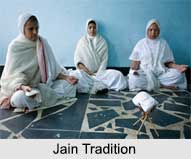 Jainism primarily assumes that the universe, with all its constituents or components, is without a beginning or an end. It is everlasting and eternal, and that the wheel of time incessantly revolves like a pendulum in half circles from the descending to the ascending stage. A unit of the cosmic time is called "Kala". This is divided into two parts, viz. the Avasarpini (i.e. descending) and the Utsarpini (i.e. ascending). According to Jain tradition, in each, Avasarpini and Utsarpini Kala, 24 Tirthankaras are born.
Jainism primarily assumes that the universe, with all its constituents or components, is without a beginning or an end. It is everlasting and eternal, and that the wheel of time incessantly revolves like a pendulum in half circles from the descending to the ascending stage. A unit of the cosmic time is called "Kala". This is divided into two parts, viz. the Avasarpini (i.e. descending) and the Utsarpini (i.e. ascending). According to Jain tradition, in each, Avasarpini and Utsarpini Kala, 24 Tirthankaras are born.
Sources of Jain Tradition
Jain Tradition is borne out by literary and archaeological evidences. Several evidences suggest the prevalence of the practice of worship of Rishabhadeva. They are as follows:
•Literary Sources: In the Buddhist literature, Jainism is not shown as a new religion but is referred to as an ancient religion. Buddhist literature refers to the Jain tradition of Tirthankaras and specifically mentions the names of Jain Tirthankaras.
The Hindus, acknowledged Rishabhadeva as a divine person. In the Rig Veda there are clear references to Rishabha, the 1st Tirthankara. The Yajur Veda also mentions the names of three Tirthankaras, viz., Rishabha, Ajitnath and Aristanemi.
•Archaeological Sources: According to ancient inscriptions, it can be asserted that Rishabhadeva must have been the founder of Jainism. There are evidences that prove there were people who were worshipping Rishabhadeva as a form of statue. This has been recorded in the Kharvela inscription engraved in Hathi Gumpha, Udaygiri caves in Bhubaneshwar, Odisha. Many relics from the Indus Valley excavations suggest the prevalence of Jainism in the ancient period.
Antiquity of Jain Tradition
Lord Mahavira was the last Tirthankara of Jainism and he preached the religion. Eminent historians have proved that Parashvanath was a historical personage and a great preacher of Jain religion. According to the Jain tradition, the predecessor of Parashvanath was Neminath, the 22nd Tirthankara. He was the cousin of the Lord Krishna of the Mahabharata. Samudravijaya, father of Neminath and Vasudeva, father of Krishna were brothers.
Features of Jain Tradition
Jain tradition holds that all Jivas are equal. It believes that the final goal of human life is obtained only by self-effort, and not by the grace of either God. According to Jain tradition, renunciation is the only way of attaining the state of liberation. Jainism believes that universe with all its components is real.
The concept of God as "The Creator" of the world is not acknowledged in Jainism. Ahimsa is the central principle of Jain religion. According to Jainism there are infinite souls and all are independent. It believes that though life is full of sufferings, liberation is possible from cycle of birth and death. Every soul desirous of Emancipation can attain that through his personal efforts.









